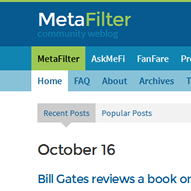How Compensation Studies Help Underpaid Community Managers

By: 401(K) 2012 – CC BY-SA 2.0
Compensation studies are most beneficial (at least in the short term) for professionals who are underpaid. It helps them ask for raises, which then raises the averages, which helps the space as a whole.
That’s why you should be paying close attention when a new study is released. The other day I wrote about the latest one, conducted by The Community Roundtable. This data helps move us forward and directly helps the professionals within this space.
Read More




 The other day I wrote about qualifying new members and the idea of
The other day I wrote about qualifying new members and the idea of  One of my favorite community management blogs hasn’t published a new post in 10 years.
One of my favorite community management blogs hasn’t published a new post in 10 years.

